|
REFILL
ABOUT -
CONTACTS - FOUNDATION -
HOME - A-Z INDEX
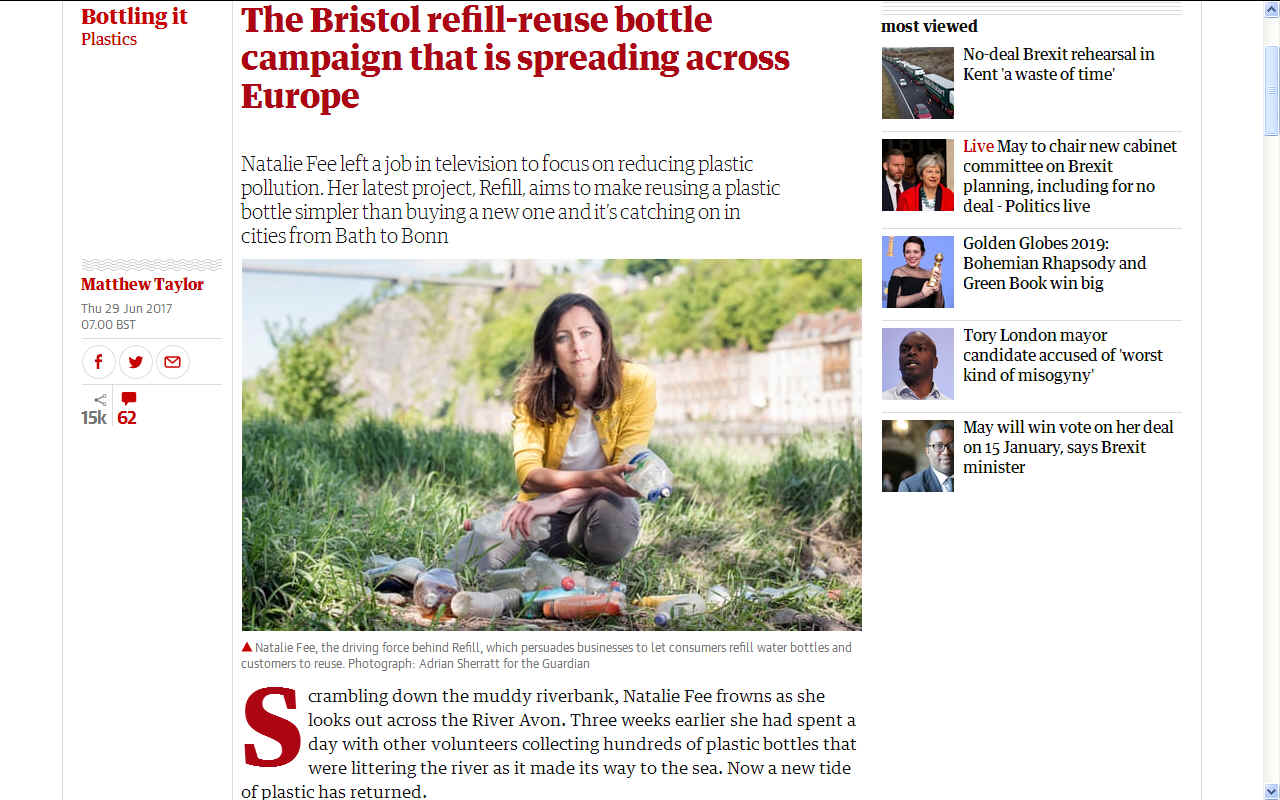
OUR
OCEANS ARE IN DANGER - There
are many ways that an organization can contribute
to the health of our oceans. Helping people to reduce their
plastic footprint and disposing of waste thoughtfully is vital
awareness work.
The
Cleaner Ocean Foundation assimilates the information that has
been gathered by others and looks at alternatives to solutions
that exist, in the hope of bringing something new to the
table. SeaVax has been identified as a platform with potential
for many uses aiming towards ocean salvation, including: 1.
responsible fishing
vessels, 2. plastic waste collection and
3. oil spills containment. Finally, the SeaVax
is solar and wind powered and may help to pave the way for
zero emission cargo
and passenger
vessels of the future.
THE GUARDIAN
29 JUNE 2017
The Bristol refill-reuse bottle campaign that is spreading across Europe.
Natalie Fee left a job in television to focus on reducing plastic
pollution. Her latest project, Refill, aims to make reusing a plastic bottle simpler than buying a new one and it’s catching on in cities from Bath to Bonn
Scrambling down the muddy riverbank, Natalie Fee frowns as she looks out across the River Avon. Three weeks earlier she had spent a day with other volunteers collecting hundreds of plastic bottles that were littering the river as it made its way to the sea. Now a new tide of plastic has returned.
“In a sense it is dispiriting,” says Fee as she starts to gather up the bottles strewn along the bank. “In another way, it just highlights how important it is we keep pushing ahead with the work we are doing.”
Fee, 38, is the driving force behind a campaign which aims to cut the millions of plastic bottles that end up in the world’s oceans each year. The Refill campaign persuades businesses to sign up to a scheme allowing people to refill their water bottles on their premises rather than throw them away.
Fee launched the project in 2015 and a couple of months later 200 businesses in Bristol had signed up. Now towns and cities across the
UK and
Europe are joining.
“All we are doing is linking people who want water with businesses and organisations who have taps and are happy for them to be used, but it has really taken off,” Fee said.
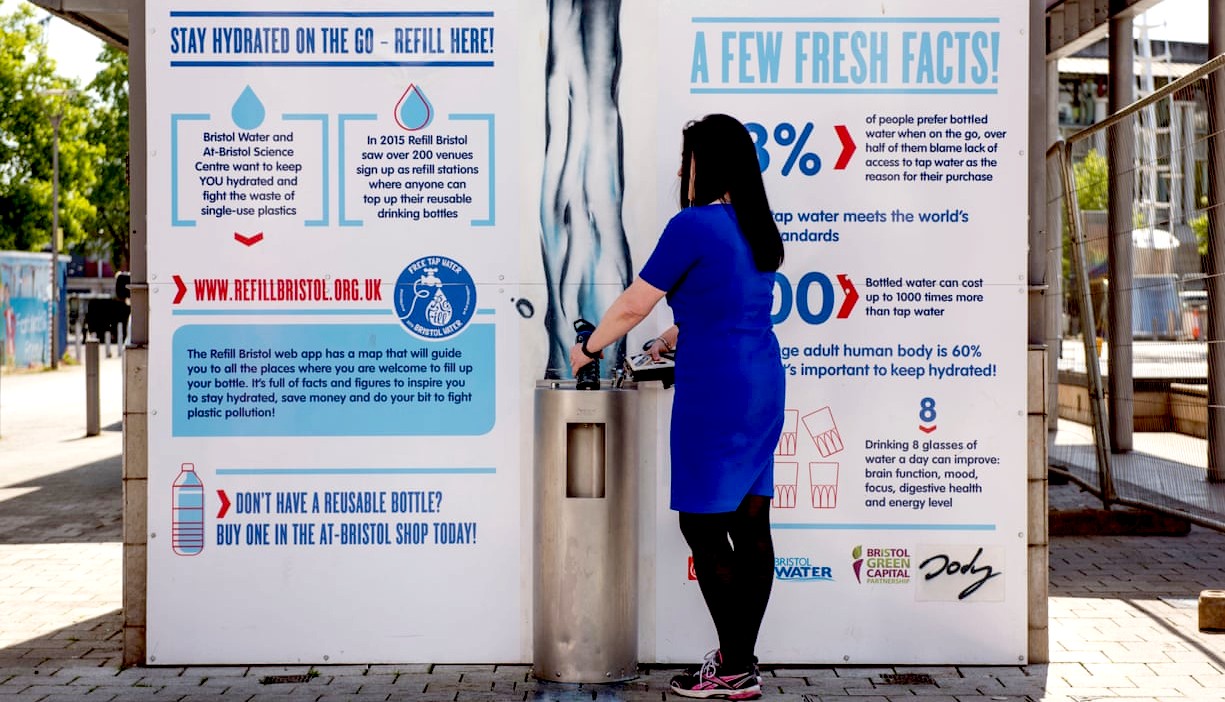
A Refill app shows which businesses nearby are happy to fill water bottles. The app offers reward points when people fill up their bottle, which can be redeemed to earn a stainless steel water bottle. The longer-term ambition is that users will be able to translate points into vouchers for ethically produced clothes and equipment – and even be informed about traders who avoid plastic waste.
As well as about 200 cafes, businesses, pubs and shops in Bristol, the movement has spread to Dorset, Devon and Bath. Norwich and Brighton are close to launching, and Hull, Leeds and Manchester are among other UK cities that have expressed an interest.
After Bristol was named European Green Capital in 2015, the Refill campaign was promoted as a “legacy project” and now sister schemes have launched in Hamburg, Bonn and other German cities.
“Every time someone refills a bottle rather than throws a plastic one away, we are reducing the amount of plastic that reaches the ocean,” Fee said.
Further afield, there is a similar acknowledgment that something has to be done to reduce the startling growth in use of plastic bottles. Almost half a trillion (500,000,000,000) will be used in 2017 alone.
In Australia, the drive to stop bottles being thrown out after a single use has manifested in a growing number of water fountains in public spaces that encourage people to refill their bottles.
Many councils, shopping malls, universities and other public space operators have contracted companies to install the water fountains with visible and convenient attachments made to refill bottles in areas of high pedestrian traffic, and some have produced websites and apps, showing people where they can find the fountains.
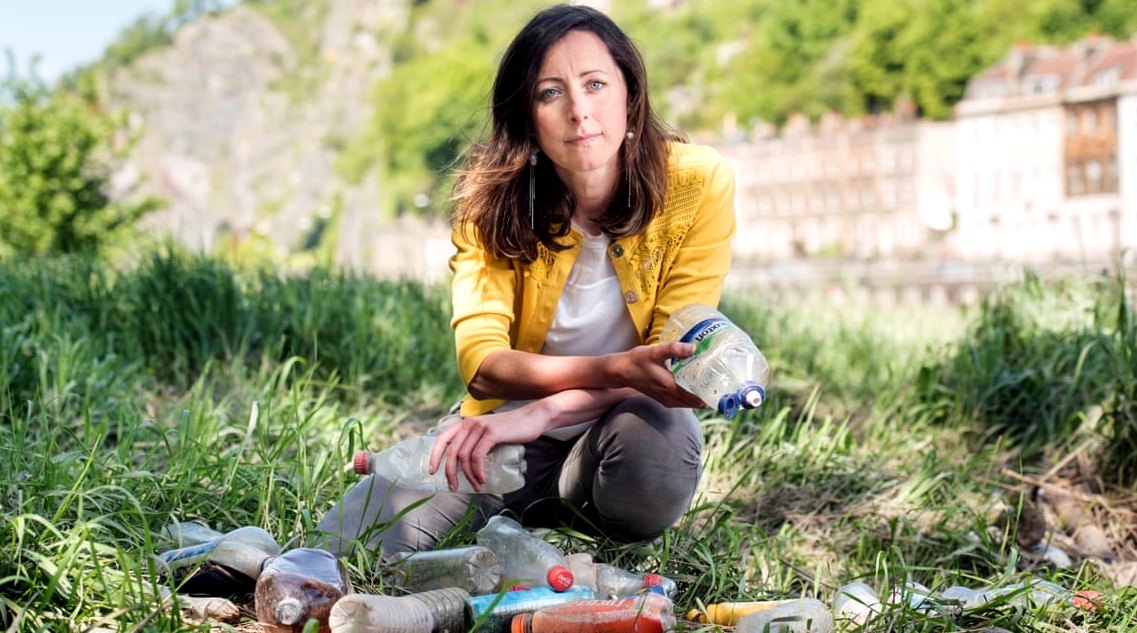
The UK campaign calculates that if every Refill station in Bristol performed just one refill everyday, 73,000 fewer plastic bottles would be thrown away every year in Bristol alone. If every Bristolian refilled once a week instead of buying a single-use plastic bottle, the city would reduce its waste plastic bottle consumption by 22.3m a year.
Fee, who worked in television before launching the campaign, was inspired to abandon her media career after seeing a video about the damage plastic was doing to albatross chicks.
She launched the City to Sea campaign group in 2015 – which has already persuaded the major supermarkets to stop using plastic in their cotton buds – and now Fee has turned her attention to plastic bottles.
In Bristol’s Canteen cafe, Gus Hoyt, the campaign’s programme manager, explains how the project now has the backing of several regional water companies and has just secured a grant from the outdoor clothing company Patagonia.
“We want to see this scheme everywhere within the next three years,” Hoyt said. “It’s about local groups deciding they want to get involved and setting something up in their area on a grassroots level. We’ve got more people getting in touch every day.”
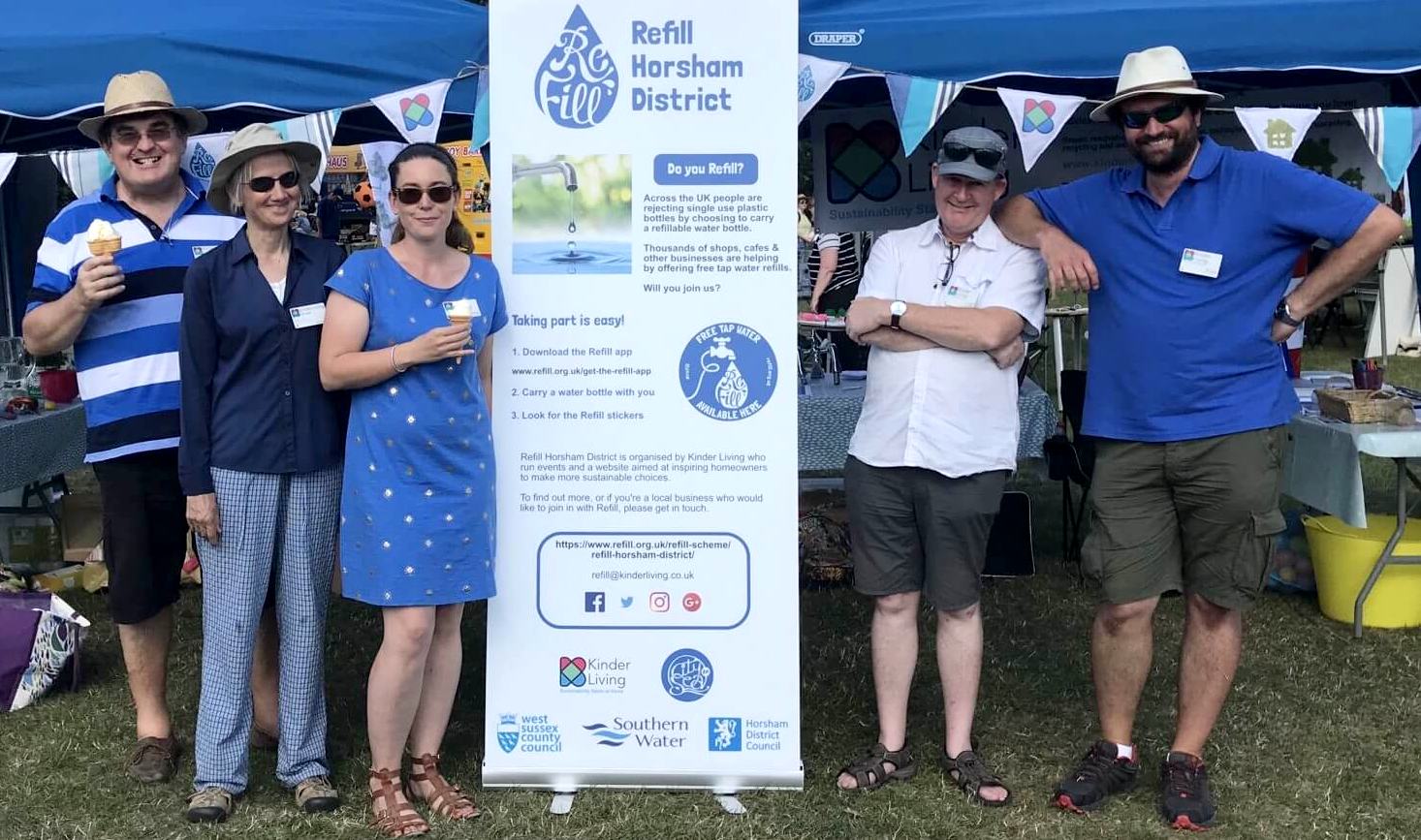
Hoyt said a few residents from Hunstanton on the Norfolk coast got in touch recently after a
sperm whale was stranded on a local beach.
“It turned out the whale had huge amounts of plastic in its stomach and the local people wanted to do something about it so they got in touch and now there is a Refill Hunstanton project ready to launch this summer. People are doing it for themselves.”
Back on the banks of the Avon, Fee has gathered a small mound of
plastic bottles from the riverbank in a few minutes.
“We’ve still got a long way to go to get people in the habit of refilling and refusing single-use. But it feels like things are changing, that there is an appetite to do things differently.”
By Matthew Taylor and Michael Slezak
REFILL
CONTACTS
Jo Morley: +44 (0)7538 173211
Email: Jo@citytosea.org.uk
Unit D, Albion Dockside Building
Hanover Place
Bristol, BS1 6UT
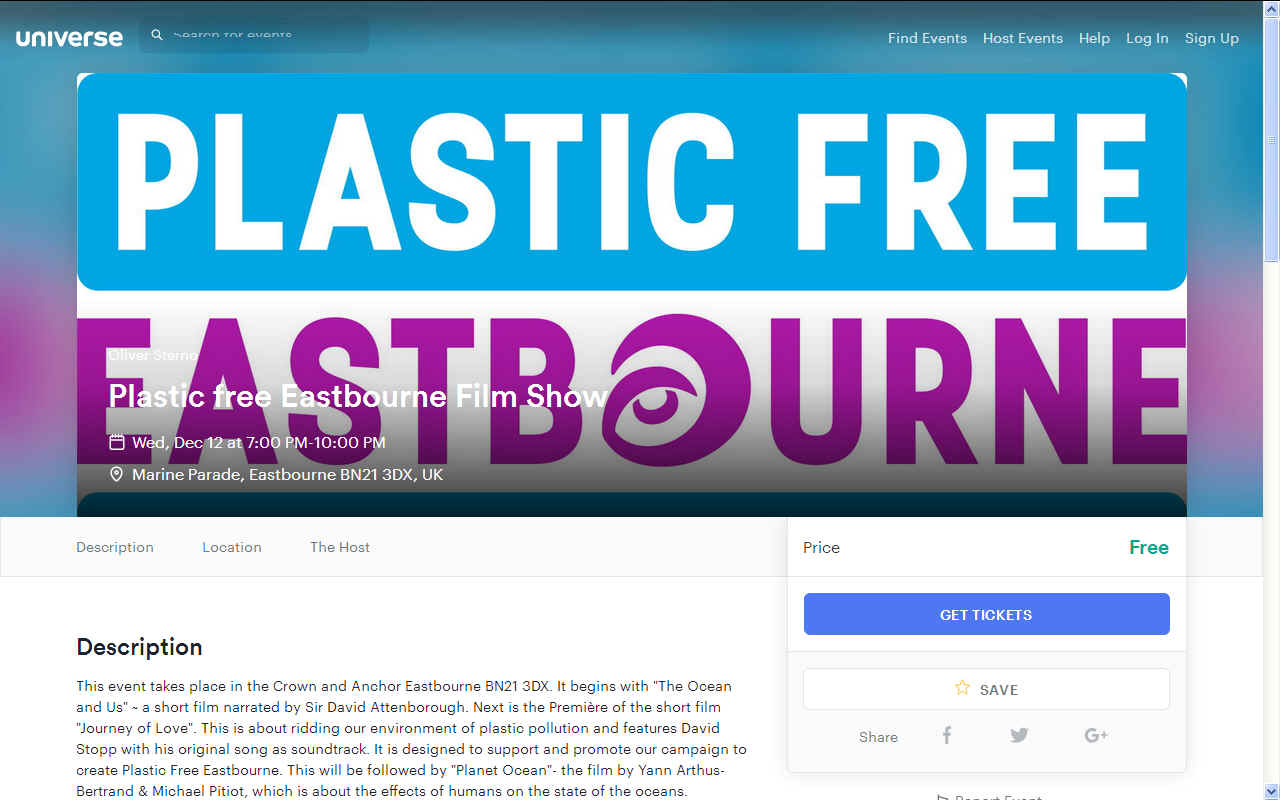
SATURDAY
26 JANUARY 2018 - ENTERPRISE CENTRE, EASTBOURNE
This
is a free to attend event on two levels at the Enterprise
Centre in Eastbourne and all are welcome, though space is
limited. Mayor of Eastbourne Councillor Gill Mattock has
kingly agreed to open this event.
A Refill Scheme is an organised group of individuals, who are coordinating the Refill mission in their local area.
Together the community-based Refill Schemes have put thousands of Refill Stations on the map, working in their local community & helping to stop millions of plastic bottles at source.
There are now over 100 Refill Schemes across the UK and the Refill Revolution has started to roll out internationally.
The campaign works by connecting people who are looking for water with thousands of local business, transport hubs and public spaces where they can Refill for free. Anyone can download the free app to find Refill Stations near them where they can refill for free on the go. Participating cafes, bars, restaurants, banks, galleries, museums and other businesses simply sign up to the app and put a sticker in their window – alerting passers-by that they’re welcome to come on in and fill up their bottle. There are now more than 14,000 Refill Stations on the app in the UK alone – including railway stations, airports and high street chains.
We want to disrupt the current social norm that we need to buy bottled water when ‘drinking on the go’ and make it normal and easy for people to carry a reusable bottle and refill for free when out & about. The objective of Refill is to stop millions of plastic bottles at source each year and prevent plastic pollution by making reusing a bottle simpler than buying a new one.
David
Stopp lives in Eastbourne in Sussex by the sea. He was so
concerned about plastic
poisoning our fish
and polluting our beaches
that he decided to write a song
about it. David has agreed to perform it at the forthcoming
Refill event to be held at the Enterprise Centre near the
station - in Eastbourne on Saturday the 26th of January 2019.
David should be in Eastbourne to speak about his experiences
all around the world, wherever he has spotted plastic on the
shores in other countries. This is an international problem,
with the United
Kingdom a victim of serious beach pollution
as an indicator of the consequences of our dependence of
single use plastic for food wrapping.
LINKS
& REFERENCE
https://www.theguardian.com/environment/2017/jun/29/the-bristol-refill-reuse-bottle-campaign-that-is-spreading-across-europe
https://www.mcsuk.org/
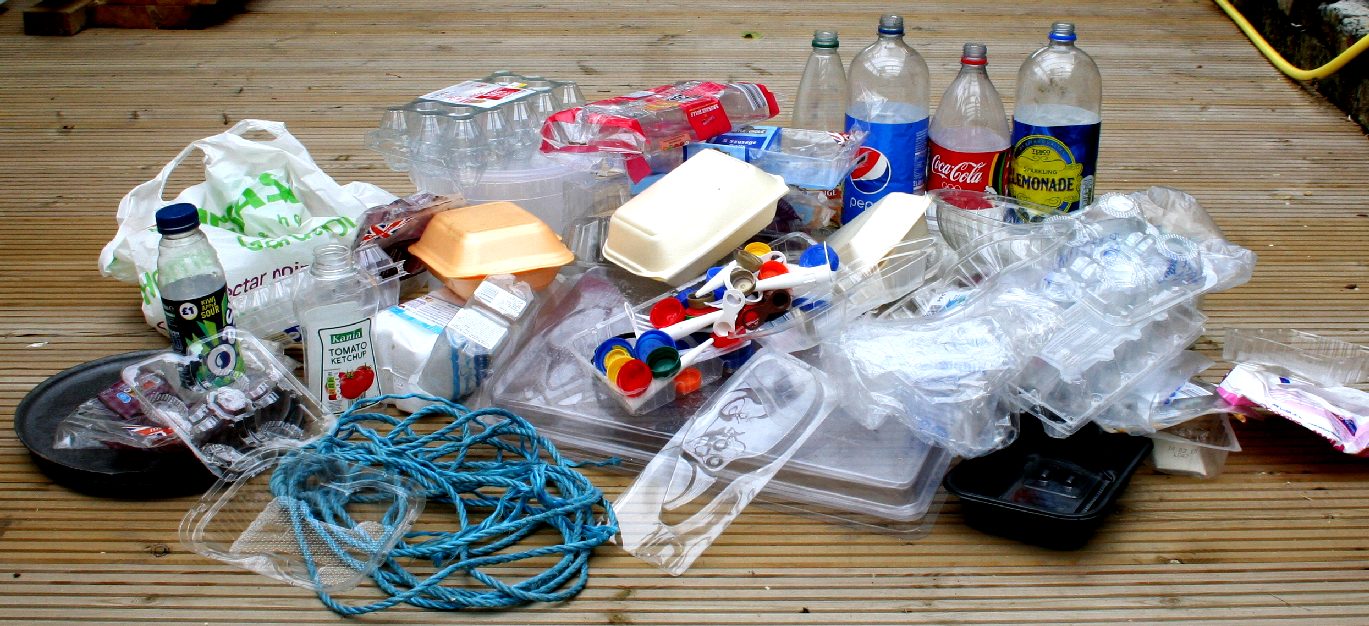
SINGLE
USE PLASTICS - This is
just a small sample of the plastic packaging that you will
find in retails stores all over the world. A good proportion
of this packaging - around 8 millions tons a year, will end up
in our oceans, in the gut of the fish
we eat, in the stomachs
of seabirds and in the intestines of whales and other marine
mammals. Copyright photograph © 22-7-17 Cleaner
Ocean Foundation Ltd, all rights
reserved.
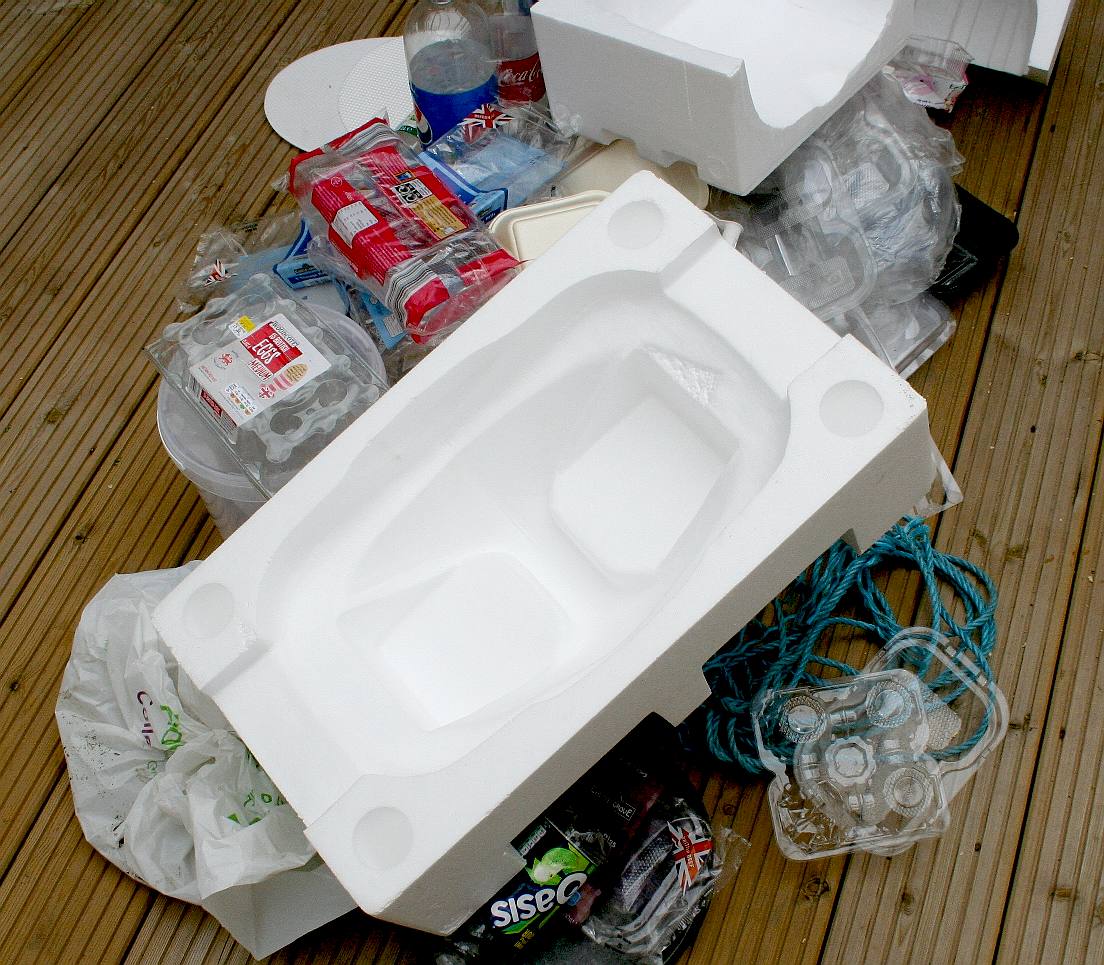
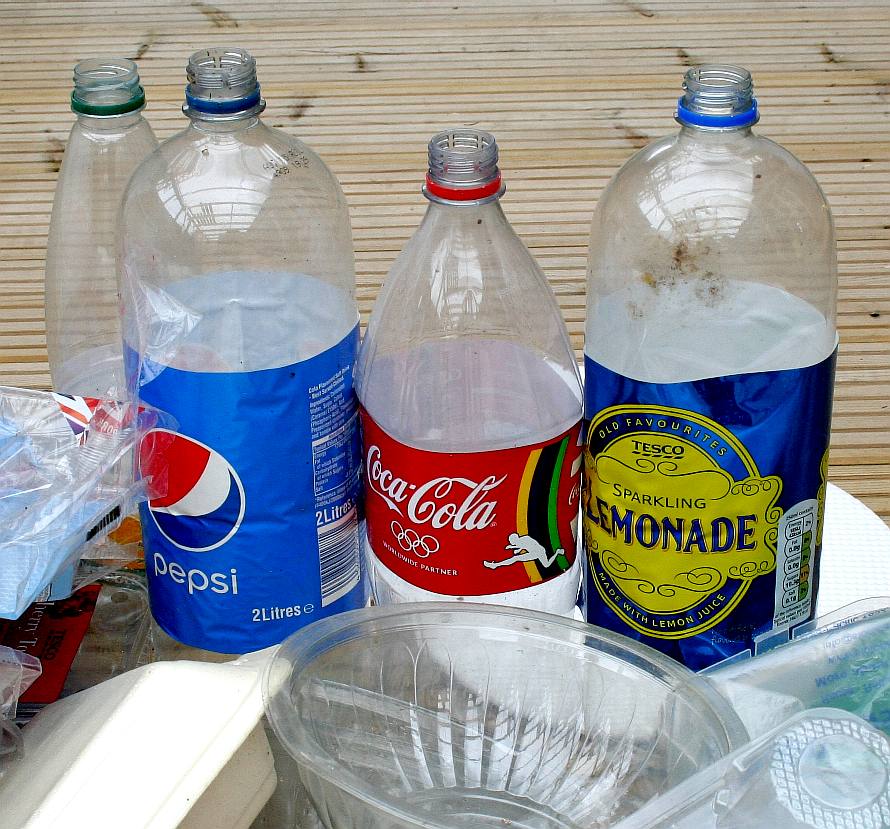
FOAM
& BOTTLES - Expanded polystyrene is
used to package household electrical goods, while soft drinks and water is
sold in PET plastic bottles by the billions every year. The numbers are
staggering. It's no wonder then that some of this plastic will end up on our
plate in one form or another, potentially as a toxin carrier. Copyright
photograph © 22-7-17 Cleaner Ocean Foundation Ltd, all rights reserved. Animals do not recognize polystyrene foam as an artificial material and may even mistake it for food. Polystyrene foam blows in the wind and floats on water, due to its low specific gravity. It can have serious effects on the health of birds or marine animals that swallow significant quantities.
ABS
- BIOMAGNIFICATION
- BP DEEPWATER - CANCER
- CARRIER BAGS
- CLOTHING - COTTON BUDS - DDT - FISHING
NETS
FUKUSHIMA - HEAVY
METALS - MARINE LITTER
- MICROBEADS
- MICRO
PLASTICS - NYLON - OCEAN GYRES
- OCEAN WASTE
PACKAGING - PCBS
-
PET - PLASTIC
- PLASTICS
- POLYCARBONATE
- POLYSTYRENE
- POLYPROPYLENE - POLYTHENE - POPS
PVC - SHOES
- SINGLE USE
- SOUP - STRAWS - WATER
This
website is provided on a free basis as a public information
service. copyright © Cleaner
Oceans Foundation Ltd (COFL) (Company No: 4674774)
2019. Solar
Studios, BN271RF, United Kingdom.
COFL
is a charity without share capital.
|







